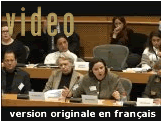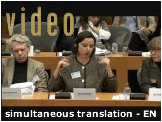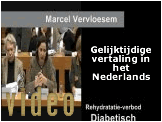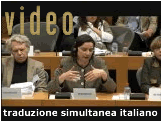| Organe de presse | ||||
| HOME | ||||
| Change
language |
|
|||||||||
| Droit Fondamental | |||||||||
Author:
Fondation Princesses de Croÿ et Massimo Lancellotti - Forwarded on Novembre
30, 2008 at 20h45, accepted by the Commisssion of the Petition on April
21, 2009 under n°1696/2008.
Organised paedocriminality: Systematic violation of the fundamental provisions of the international law within the Union
The Zandvoort file bears the name of the Dutch city where Gerrit Ulrich, a German citizen, marketed photographs of pornography and torture of children. It was discovered the 11 and 19 June, 1998, by Werkgroep Morkhoven, a Belgian NGO active in the search of missing and sexually exploited children, following the indications of a Belgian victim of the network. The Dutch investigators could seize in the residence of Ulrich, a CD containing 90.000 photographs, of the diaries and address books.
The Werkgroep Morkhoven feared that the Belgian authorities would close the file without proper justification, owing to the fact that they were systematically closing all the cases children's kidnapping within the framework of the production of these images, as voluntary running away. The NGO has thus decided to forward the CD to the authorities in several stages. The first CD was given in July 1998, with the international press as witnesses.
Mrs. Bernard-Pardaens, volunteer of the NGO made a fragmented copy of the CD, to expose the file to the other NGO and the press, while ensuring to maintain the difference between these CD and the original ones, for the necessity of the inquiery. She gave the fragmented copy of the first CD to journalists and fragmented copies of the 21 CD to a Swiss organisation CIDE (International committee for the Dignity of the Child). Mrs. Bernard-Pardaens was murdered a little later, on November 14, 1998.
The Werkgroep Morkhoven sent on April 9, 1999, the full version of a CD to various Heads of State, of which to Jacques Chirac, President of the French Republic and seven extra CD to the King of the Belgians. The Belgian Superior council of Justice confirms in its letter of February 21, 2008, ref. N/07/0185/BDM/KDB, that these seven CD were delivered on April 13, 1999 by the judicial police. The file was closed (secretly), on July 18, 1999, for the reason of "unknown culprits", following what it was stolen, CDs includes, from the Law courts!
The spokesperson of Werkgroep Morkhoven, Marcel Vervloesem, who shared his residence with the head office of the NGO, was prosecuted to have possessed these CD. The NGO has then asked an official request to give the totality of the material, in order to prevent a condemnation for an act of good citizenship. None of the countries touched by the network, answered the request. France judged the appropriateness of the investigation only on February 24, 2000, that is to say nearly one year after having received the first CD, when the French press exposed the file.
Juan Miguel Petit, Special Rapporteur for the United Nations on the sale children, the prostitution of the children and the pornography implying children states only one CD 8000 criminal photographs in his report E/CN.4/2003/79/Add.2. He did not meet the Werkgroep Morkhoven that the Belgian authorities and the state controlled press made pass for bandits. On the other hand, he specifies that: "Interpol indicated (…) that the Dutch authorities had simply sent it to the countries which appeared concerned."
On April 4, 2001, at the request of Prosecutor Bourlet of the legal district of Neufchâteau in Belgium, the Werkgroep Morkhoven gave the twenty missing CD, as the evidence of a detailed complaint, together with press articles, official reports and interviews that exposes children kidnappers, brothels and escort services that exploited children, of producers, editors and publicity agents of child pornography, etc
An INTERPOL report of August 23, 2003 assures that these 20 CD enclose 93.081 photographs. The Belgian federal police (statement n° 100470/03 d.d. 23-12-2003-DGJ-DJP-MH) assures that the number of single photographs is of 88.539, of which 70% represent children clearly abused.
The first CD was not included in the inquiry. Ulrich all the same in possession of around 191000 photographs (93000 + 90000 + 8000), whose number of doubles is unknown, due to the lack of transparency of the Dutch inquiries.
On March 20, 2003, the French judge Danielle RINGOT issued about the sole first CD (8000 photographs) that "no infringement of sexual offence on minor, corruption of minors and diffusion of image of minor in pornographic matter was thus characterized on the (French) national territory".
In short:
- France closed the case in the absence of 88.539 basic parts with the file, which it parcelled out further in a multitude of small files, which were all judged separately. The parties claiming charges were then condemned on the basis of this judgment, for having wanted to protect their children, accused of non presentation of children, of parental abduction and attacking the honour.
- Belgium hid the theft of the seven CD, of which the last trace dates of July 18, 1999. It never forwarded the twenty CD to the French justice, though essential to a fair judgment. This November 19, 2008, the UN Committee against tortures of the has confirmed the Belgian policy as regards the human trade (CAT/C/SR. 860) and noted the "gaps of the international cooperation in order to bring to justice the authors of the infringements".
- Holland has maintained the Zandvoort file apart from the Brongersma file, named after a Dutch senator who committed suicide after realising that the photograph of naked children trade whom he had initiated, had led to a trade of photographs of tortures and murder of children. He was on the Zandvoort lists. Shortly before his suicide, he had written to Marcel Vervloesem of the Werkgroep Morkhoven, to advise him that he had communicated his "collection" to the German police force.
- Switzerland trapped several French mothers by a letter of request to identify French children on a fragmented copy of the CD it got from the organisation CIDE. Switzerland failed to ask a copy of the full version to the Werkgroep Morkhoven or to forward a copy of fragmented version the French authorities, so that the French inquiry on French citizens may be done in France.
Switzerland gave a temporary political asylum to these mothers, and then refused the final political asylum. They were then arrested in Switzerland, by INTERPOL and imprisoned, following a French sentence for parental abduction. The custody of the children was then systematically given to the fathers these children accuses of sexual abuses.
- INTERPOL, which was very effective to arrest the French mothers in Switzerland, seems to have been very ineffective to expose the width of the file to the UN Special Rapporteur.
On February 10, 2005, in answer to the petition N° 186/2004 to the European Parliament on the sabotage of the judicial enquiries related to the paedocriminal networks by the Belgian authorities, the Commission said:
While the European Union may therefore, on the basis of Article 31 TEU, have legislative competence with regard to the fight against child sexual exploitation and child pornography, it does not have the same powers with regard to the holding of judicial investigations in individual cases. The latter, according to Article 33 of the TEU, is the responsibility of the Member States. Accordingly, the Commission is not entitled to express its views on the manner in which judicial investigations into paedophile criminal networks are held in Belgium.'
It is not a question of "individual cases", but of a crime against humanity, whose number of victims in ten years, has passed from one hundred thousand to two million. Since, the credit cards used to buy Ulrich's picture, contributed to the Koala operation in 2007, in 19 country, and with the seizure of 2 million such images.
Tens of victims and witnesses in Belgium, France, Holland, Portugal etc, complain about simulations of identical miscarriage of justices : delaying tactics prolonging the procedures; disappearance or elimination of the parts of defence; appraise of psychiatrist reversing the roles of the plaintiff with the person blamed; serial procedure faults; imprisonments and internments in violation of the national laws and several cases of torture.
Even more serious: the victims complain about the impossibility of obtaining assistance of the public services or the battalion of NGOs who are presented as active in the field. The rare NGO bringing them support are immediately persecuted without getting minimum assistance from the competent authorities.
Dirk Tahon's interview on the Belgian television, who explains the modalities of child trafficking from his bar in Belgium for Holland (Faits Divers RTBF - March 1998), shows that it is not these bar tenders who maintain these networks, but the judges who keep them free and simulate miscarriages of justice to destroy the plaintiffs.
Marcel Vervloesem, who exposed the Zandvoort network, was condemned to 4 years of prison for facts that he is recognized medically unable to do. The Belgian ministry of justice refuses him the medical care necessary to ensured he may survive, the time requested to the European Court of the Human rights to release him. He has hardly any chance to survive the time the Commission answers this petition.
The first tribunal that condemned Marcel Vervloesem in absence of 42 discharging evidence, has released Filip De Graeve, direct collaborator of the current Belgian Minister of home affairs of a case including a prostitution network and the ordering of a Moldavian child for 1000 euros the night, under pretext of an " incompleteness that violates rights of the defence".
Maoloni Maria-Pia, of Belgian nationality, on holiday in Italy, was condemned for parental abduction in Belgium, and then released of these charges in Italy. Meanwhile the custody of her daughters was granted to the father before he had to answer of a penal procedure, his eldest daughter reproaching him a cut hymen when she was 4.
Patricia Poupard is one of the French mothers, who claimed charges in the Zandvoort case in France and was trapped by Switzerland. The temporary political asylum has cost her ten and a half months of preventive detention, matched of an internment in violation of the French laws, in spite of a blood analysis showing that her son had venereal disease at the age 7 years. The custody of the child was given to the father, who turned out to be the husband in first wedding, of a "top-class" prostitute. Patricia Poupard has recently been condemned to pay moral damages to the father, for having asked to the custody of her son, again on the basis of the closing of the file that had cleared the father, in absence of 88.539 basic evidences. He currently obtains to have her allowance of survival seized, by bailiffs, who do not claim to know that this allowance is not sizable by the French law.
The Portuguese investigators who exposed Dr. McCann as being the murderer of her missing daughter, has also obtained the condemnation of Mrs. Cipriano to 16 years of prison, by accusing her of having chopped her daughter and given her to eat to the pigs, to explain the defect of corpse.
In 2001, Belgium has participated to the international police operation "Hamlet", following the identification of Pascal Taveirne, a Belgian citizen, on a pornographic film where he abuses his daughters. He was left free to carry on exploiting them until 2006. He had again been identified by INTERPOL on a film produced by an Italian citizen, presumed by the Italian police as one of the main producers for the Zandvoort network. The girls were entrusted to their mother, who had never protected them from this trade.
In France also, justice refuses any charging and discharginf investigation on a French high-ranking magistrate, dandy of the child welfare, which a biometric analysis identified to 99.03% as being the adult being reproduced on a photograph of the Zandvoort file with a 11 year old boy, both underpants-less.
The list of these cases is never-ending and show seven of the eleven deeds retained as crime against humanity by the article 7 of the Statute of Rome. These deeds are done "within the framework of a systematic attack directed against a civil population and in knowledge of the attack". They include:
- Murder;
- Imprisonment or another form of deprivation engraves physical freedom in violation of the fundamental provisions of the international law;
- Torture;
- Rape, sexual slavery, forced prostitution;
- Persecution of an identifiable group for reasons for order sexist and… pecuniary;
- Forced disappearance of people
- Other inhuman acts of nature similar intentionally causing great sufferings or gravely hurts to the physical integrity or physical or mental health.
We wish to know the position of Europe vis-à-vis the maintenance in public offices, of magistrates and civil servant, who are unaware of the fundamental provisions of the international law; of the possibility of installation of the European laws to fight against the sexual exploitation of children and to grant a real help service to the victims.
The Non Governmental Organisations parteners of the Foundation Princesses de Croÿ et Massimo Lancellotti believe in the necessity of a European service of mediation to draw a bridge between international police forces, the local authorities and the citizens’ victims or witness of the organized paedocriminality.
Commission on the Petitions - 1.9.2009
NOTICE TO MEMBERS
Re: Petition No. 1696/2008, presented by Jacqueline de Croÿ, a Belgian national, on behalf of the "Foundation Princess Decroÿ, the need for Community measures to counter sexual exploitation of children and support victims these abuses
1. Summary of petition
The petitioner critical deficiencies at national level in various Member States of the European Union, due to which those responsible for the sexual exploitation of minors are often left unpunished. She asks the European Parliament to intervene for the immediate adoption of European legislation designed to fight against such crimes and providing adequate support to victims. She advocates for the creation of a European office which would act as a bridge between, on one hand, local authorities and Interpol, and secondly, victims or witnesses of pedophiles.
2. Admissibility
Declared admissible March 26, 2009. The Commission was asked to provide information (Article 202, paragraph 6 of the Regulation).
3. Commission reply, received September 1, 2009.
Petition
The petitioner alleges systematic legal errors in many countries (Belgium, Netherlands, France, Portugal, Switzerland) committed intentionally to interfere with criminal investigations of child sexual abuse, in order to protect judges or people close to the judiciary, which are themselves involved in such abuse. The petitioner notes that he is not about individual cases.
The petition follows another petition on the same subject for Belgium (186/2004).
The Commission's comments on the petition
Under Article 29 of the TEU, the European Union's objective to provide citizens with a high level of protection in an area of freedom, security and justice is achieved in particular by the fight against crime against children. The Treaty provides for the purpose of joint action in the areas of police and judicial cooperation in criminal matters.
It is on this basis that the Union has exercised its legislative powers, whose most important instrument is the Framework Decision 2004/68/JHA of 22 December 2003 on the fight against sexual exploitation of children and child pornography. This Framework Decision brings national laws, particularly regarding the definitions of criminal offenses, sanctions and jurisdiction.
To improve the level of protection in a comprehensive approach involving the prosecution of perpetrators, child protection and crime prevention, the Commission presented 25 March 2009 a proposal for a Council framework decision on the operation and sexual abuse of children and child pornography, repealing the Framework Decision 2004/68/JHA.
However, the EU has no competence in criminal investigations of individual cases. According to Article 33 TEU, the maintenance of public order remains the responsibility of Member States.
Conclusion
The Union is unable to review the decisions of judicial authorities in criminal matters and can not intervene in the cases mentioned by the petitioner. Therefore, the EU can not give more useful to this petition.







